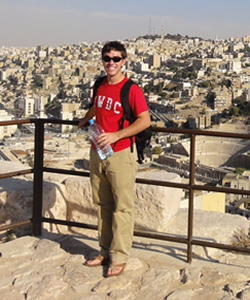
Nick Shaker
Nick Shaker (C'12) graduated from Georgetown College in 2012 with majors in Arabic and English. He participated in the Berkley Center's Junior Year Abroad Network while studying in Amman, Jordan during the 2010-2011 academic year.
I live in a country on the verge of a political revolution. In fact, the entire political cabinet was replaced only a few weeks ago on a whim. Bedouin leaders in the south are threatening the king, pressuring him to pull his wife out of the public eye because of her Palestinian heritage. Furthermore, every headline article I see about the Middle East these days mentions Jordan as a country walking a thin line between peace and total collapse. You would think that life here is incredibly tense, but I haven’t noticed a thing.
Thousands of people have gathered in downtown Amman in the past weeks, protesting public policies and corrupt leaders. I watch it on the news every night with my host family, but in my daily life at my house, school, and gym, I see no signs of strife. Even when I go hang out in cafes near downtown there is no evidence of thousands of people gathered to protest. From my interactions with people, I can sense almost no sense of urgent change. In taxis, where the topic of conversation always goes back to politics, there is no discussion of the looming changes in Jordan.
It seems odd to me that when the New York Times makes it sound like all hell is about to break loose, I cannot see the signs on the ground. Maybe I am not looking well enough, or maybe the signs are there and I am just missing them. But what I do know is that coming from America, we are much more sensitive to political change and upset than in the Middle East. In the last 10 years, most Middle Eastern countries have experienced a major political change. Sometimes this manifests itself in war, other times in moderately peaceful revolutions, but wherever you look, power is shifting and alliances are being redrawn. After all this, many Arabs have grown accustomed to drastic changes and learned how to live their lives unaffected by the political atmosphere.
My host parents are a perfect example of this. Originally from Palestine, they moved to Jordan after 1948, relocated to Kuwait after Black September, and returned to Amman with the outbreak of the Gulf War. Amazingly, while experiencing all this, they raised a family, kept their jobs, and sent three sons to university. When looking back on it, they laugh a little about all the places they have lived and the chaotic times when they moved. From an American standpoint, I can’t imagine having to move because of war three times in my life and then reminiscing about it lightheartedly and with no apparent hard feelings.
When I asked them about Israel, they gave me a similar reaction. Both of them are pro-Israel and don’t seem phased by what is going on in their hometowns—Jerusalem and Jaffa—right now. They seem resigned about the whole peace process and shrug it off as something for the politicians to deal with and not something they want to get involved in. Again, from an American standpoint, this is unheard of. Americans are incredibly sensitive to any changes, such as a power shift in the Senate or another one of Lieberman’s party switches. The moment we hear about a protest against the government we get nervous and expect (appropriately) for Anderson Cooper and other popular news sources to cover the topic extensively. This nervousness is simply not a part of most Arabs’ lives.
At first I thought this overreaction was a general issue with Americans, but looking back at my life, I remember a few exceptions. When I was in fourth grade, the World Trade Organization had a conference in my hometown of Seattle. There were massive protests, hundreds of arrests, and extensive vandalism. But during that time, I went to school normally, went to extracurricular activities, and saw no signs of any chaos. Most of my experience with the WTO protests of 1999 is what I learned from the movie Battle in Seattle and what I saw on the news during that time. In the same way, my experience with the Jordanian political shuffles of late is largely based on the New York Times and Al Jazeera. Who knows, there could be a major revolution here and I won’t know a thing about it until David Brooks tells me so.